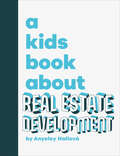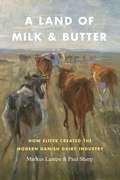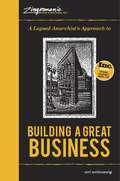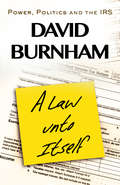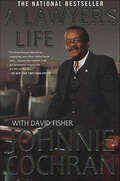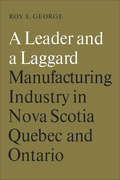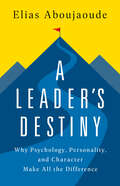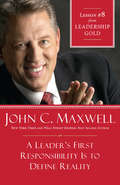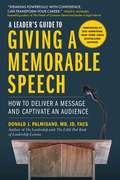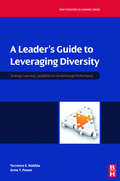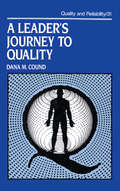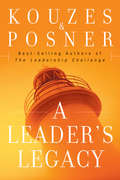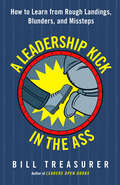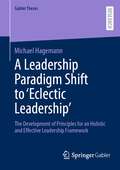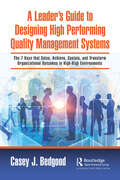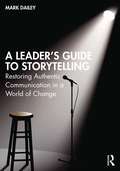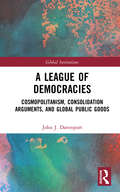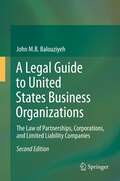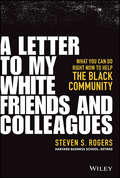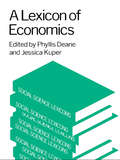- Table View
- List View
A Kids Book About Money: Kids Are Ready (A Kids Book)
by Adam StramwasserA simple framework for what money is and how to use it wisely.This is a kids book about money. Money is one of those things EVERYONE has to deal with in their life, but few of us have learned much about it. There may not be a more important topic for grownups to teach kids about than money. This book is a suitable way to introduce the topic to kids aged 5-9. It covers what money is, how to earn it, and how to use it wisely. Develop your child's financial skills in managing money including saving, budgeting and spending.A Kids Book About Money features: - A large and bold, yet minimalist font design that allows kids freedom to imagine themselves in the words on the pages.- A friendly, approachable, yet empowering, kid-appropriate tone throughout.- An incredible and diverse group of authors in the series who are experts or have first-hand experience of the topic.Tackling important discourse together! The A Kids Book About series are best used when read together. Helping to kickstart challenging, empowering, and important conversations for kids and their grownups through beautiful and thought-provoking pages. The series supports an incredible and diverse group of authors, who are either experts in their field, or have first-hand experience on the topic. A Kids Co. is a new kind of media company enabling kids to explore big topics in a new and engaging way. With a growing series of books, podcasts and blogs, made to empower. Learn more about us online by searching for A Kids Co.
A Kids Book About Real Estate Development (A Kids Book)
by Anyeley HallovaWhat do you know about real estate development? If your answer is “not a lot", you’re in the right place! Learn about this powerful industry, how it started, and how it can evolve in the future. Anyone can become a real estate developer, and everyone can be involved in how building projects impact their community.
A Kids' Guide to Manners: 50 Fun Etiquette Lessons for Kids & Their Families
by Katherine FlanneryMinding your manners is a blast with these etiquette lessons for kids ages 7 to 12 Today's kids need a fresh approach to manners that resonates with them. A Kids' Guide to Manners goes beyond saying "please" and "thank you" with fun, practical lessons that bring manners into the modern world.From meeting new people to being a courteous guest to texting a group of friends, kids will have fun as they learn to use manners in a way that will make their lives easier and more enjoyable. With 50 essential manners, plus interactive quizzes, entertaining examples, and at-home practice exercises, A Kids' Guide to Manners teaches kids where, when, and how to use manners as they relate to everyday life.With this true manners how-to guide kids will:Build good communication skills that will make it easy to get along with others, such as constructive ways to express emotions to the power of writing a thank you note.Feel confident in new situations by knowing what to do and say when meeting new people, dining in a more formal environment, or dealing with conflict and gossip.Learn proper tech etiquette that represents their best self over text, email, social media, as well as tips for knowing when it is or isn't appropriate to be using technology.With A Kids' Guide to Manners, both boys and girls will understand why manners matter and feel better than ever showing off their new social skills to everyone they know!
A Land of Milk and Butter: How Elites Created the Modern Danish Dairy Industry (Markets and Governments in Economic History)
by Paul Sharp Markus LampeHow and why does Denmark have one of the richest, most equal, and happiest societies in the world today? Historians have often pointed to developments from the late nineteenth century, when small peasant farmers worked together through agricultural cooperatives, whose exports of butter and bacon rapidly gained a strong foothold on the British market. This book presents a radical retelling of this story, placing (largely German-speaking) landed elites—rather than the Danish peasantry—at center stage. After acquiring estates in Denmark, these elites imported and adapted new practices from outside the kingdom, thus embarking on an ambitious program of agricultural reform and sparking a chain of events that eventually led to the emergence of Denmark’s famous peasant cooperatives in 1882. A Land of Milk and Butter presents a new interpretation of the origin of these cooperatives with striking implications for developing countries today.
A Lapsed Anarchist's Approach to Building a Great Business (Zingerman's Guide to Good Leading #1)
by Bo Burlingham Ari WeinzweigThe first in a series of books by Zingerman's co-founding partner Ari Weinzweig examines the basic building blocks of the culture and structure we know now as Zingerman's. These approaches are applicable whether you're running a law office, a library, a restaurant, a record label, a software firm, or an organic farm. They are the behind-the-scenes "secret" stuff that goes into making a very special, sustainable business of any kind. Inc. Magazine calls it one of the Best Books for Business Owners.
A Law Unto Itself
by David BurnhamThis is a fully documented inside examination of the Internal Revenue Service, in many ways the largest and most powerful of all federal agencies, and also the agency whose competent function is most essential to our democracy. The book's appearance in 1989 sparked a public furor and major legislation attempting to redress the IRS' many abuses of power, both political and bureaucratic. The book will be a relevant handbook as long as the agency remains a towering presence in American life.
A Lawyer's Life
by Johnnie Cochran David FisherThe most famous lawyer in America talks about the law, his life, and how he has won.Johnnie Cochran has been a lawyer for almost forty years. In that time, he has taken on dozens of groundbreaking cases and emerged as a pivotal figure in race relations in America. Cochran gained international recognition as one of America's best - and most controversial lawyers - for leading 'the Dream Team' defense of accused killer O.J. Simpson in the Trial of the Century. Many people formed their perception of Cochran based on his work in that trial. But long before the Simpson trial and since then Johnnie Cochran has been a leader in the fight for justice for all Americans. This is his story.Cochran emerged from the trial as one of the nation's leading African-American spokespersons - and he has done most of his talking through the courtroom. Abner Louima. Amadou Diallo. The racially-profiled New Jersey Turnpike Four. Sean "P. Diddy" Combs. Patrick Dorismond. Cynthia Wiggins. These are the names that have dominated legal headlines - and Cochran was involved with each of them. No one who first encountered him during the Simpson trial can appreciate his impact on our world until they've read his whole story.Drawing on Cochran's most intriguing and difficult cases, A Lawyer's Life shows how he's fought his critics, won for his clients, and affected real change within the system. This is an intimate and compelling memoir of one lawyer's attempt to make us all truly equal in the eyes of the law.
A Leader and a Laggard: Manufacturing Industry in Nova Scotia, Quebec and Ontario
by Roy GeorgeAdvanced countries in all parts of the world are concerned with the geographical unevenness of their development. Canada's preoccupation is with the Atlantic provinces, and for years government departments and agencies have tried to improve the region's economy. However, the evidence suggests that the economic gap between the Atlantic provinces and the rest of Canada has remained remarkably constant. This persistent gap has no shortage of explanations: lack of resources, the cost of transportation, insufficient markets, and a poor supply of skilled labour are problems often mentioned. This study investigates how far these and other factors account for slow industrial development. The author compares two regions of Canada: Quebec and Ontario, which together are considered the industrial leader; and Nova Scotia, the industrial laggard. He compares the costs of inputs for an average manufacturing firm in Nova Scotia from 1946 to 1962 with what those costs would have been had the firm been located in the Quebec-Ontario region. The analysis includes relative wage rates, labour productivity, the costs of materials, energy, and fuel, rates of interest and investment, transportation charges, levels of local taxation, and the supply of business enterprise. Canadian official statistics form the main basis of the comparisons, but where these are inadequate, information derived from three special studies carried out by the author is used. Dr George then explores the implications of the study's findings for public policy. He examines the relative cost and effectiveness of tax concessions, capital grants, industrial estates, transportation subsidies, and other remedial measures often advocated. Although the book uses a case study approach involving just two regions, it is relevant to the general theory of the location of industry, to regional economic policies, and to industrial development. It is essential reading for politicians and public servants who shape regional policies; for industrial promotion managers of municipalities; for businessmen choosing sites of new enterprises, and the consultants who advise them; for academics concerned with the theoretical aspects of the location of industry; and for anyone interested in industrial development.
A Leader's Destiny: Why Psychology, Personality, and Character Make All the Difference
by Elias AboujaoudeA psychiatrist puts leadership &“on the couch,&” with a provocative exploration of its crucial, often ignored, psychological and personal character foundations. Elias Aboujaoude&’s distinctive exploration of leadership explains how our cultlike obsession with leadership gives narcissists and sociopaths an edge and results in leadership failure everywhere we look—and how resisting the imperative to rise at all costs leaves many with an inferiority complex. His takedown of the leadership industrial complex pokes a very sharp elbow into an industry seemingly united in a modern form of alchemy to create leadership gold—a waste of time and money, Aboujaoude vividly illustrates, since leaders emerge from a unique combination of personal, psychological, and situational factors that cannot be easily controlled or manipulated, no matter how gifted the executive coach. This bracing take on a classic subject provides new insight into the way psychology aligns with the requirements of effective and happy leadership. The result is to empower us to understand ourselves and step up if we have what it takes to lead—or find equally rewarding, often superior, ways to achieve fulfillment if we don&’t.
A Leader's First Responsibility Is to Define Reality
by John MaxwellSmart leaders learn from their own mistakes. Smarter ones learn from others' mistakes--and successes. John C. Maxwell wants to help you become the smartest leader you can be by sharing Chapter 8, A Leader's First Responsibility is to Define Reality, of Leadership Gold with you. After nearly forty years of leading, Maxwell has mined the gold so you don't have to. Each chapter contains detailed application exercises and a "Mentoring Moment" for leaders who desire to mentor others using the book. Gaining leadership insight is a lot like mining for gold. You don't set out to look for the dirt. You look for the nuggets. You'll find them here.
A Leader's Guide to Giving a Memorable Speech: How to Deliver a Message and Captivate an Audience
by Donald J. PalmisanoExpert advice on delivering an unforgettable, stirring talk or lecture! &“Highly readable, immediately useful and deeply enjoyable!&” —John J. Nance, Aviation Analyst , ABC World News &“Insights on avoiding panic and other pitfalls, the use of rhetorical devices, and how to wow audiences from this masterful speaker who has done over 1000 speeches and interviews.&” —John N. Kennedy, United States Senator for Louisiana A good leader must be intelligent, charismatic, strong, and inspiring. A good leader must stir passion and instill knowledge in the minds of followers, whether in the field of business, medicine, politics, sports, or entertainment. A memorable speech is a powerful tool for demonstrating leadership and inspiring listeners for years to come. You can give a stirring, memorable speech, and be seen as a real leader, and Donald J. Palmisano can help you. Here Palmisano shares proven tips on delivering an inspiring and motivating speech. Drawing from his popular seminar at Tulane University School of Medicine and over 1,000 speeches and interviews, Dr. Palmisano teaches readers how to:Use rhetorical devices effectivelyStay on messagePractice deliveryGlean lessons from great speeches of powerful leaders from the past, such as Cicero, Winston Churchill, Dr. Martin Luther King, Jr., and Ronald ReaganOrganize speeches to emphasize the messageWeave in stories that are unforgettableAnd more!If you are a professor or teacher, if you are a CEO or manager, if you are thinking of running for office or trying to raise money, then A Leader's Guide to Giving a Memorable Speech belongs on your bookshelf. It's a great gift for anyone with aspirations of teaching, leading, or managing.
A Leader's Guide to Leveraging Diversity
by Anne Power Terrence MaltbiaLeveraging Diversity: Strategic Learning Capabilities for Breakthrough Performance is designed to help business leaders and diversity practitioners alike conquer the complexity and take advantage of the opportunities associated with working productively with diversity. The book presents a clear direction for building the strategic learning capabilities needed to create and sustain adaptive organizations that effectively respond to today’s competitive demands. It provides a practical guide that features a variety of proven learning practices for leveraging diversity with case examples and planning tools. The book is structured in four parts and each chapter addresses one of the three strategic learning capabilities: contextual awareness, conceptual clarity, and taking informed action. Each chapter presents cutting edge practices in support of building the targeted learning capability. They contain case examples and sample tools to assist the reader as they internalize the practices and provide guidelines for applying the tools to their specific work situations. In the final part of the book, the reader is introduced to the three critical success factors necessary to support the successful execution of the strategic learning capabilities for leveraging diversity examined in this book. Whether the reader is new to diversity work or wishes to learn how to further leverage existing diversity initiatives with other strategically important business priorities, this book provides a comprehensive blueprint for navigating the complex and changing nature of situations involving diversity.
A Leader's Journey to Quality
by Dana M. CoundThis book deals with the "hard skills" involved in achieving leadership quality. It provides a vehicle to foster interaction of the elements of the modern approach to quality, including statistical applications, quality and reliability engineering, management, and motivational aspects.
A Leader's Legacy
by Barry Z. Kouzes James M. PosnerIn this provocative book, leadership experts and authors of the best-selling The Leadership Challenge, Jim Kouzes and Barry Posner take on a unique challenge and explore the question of leadership and legacy. Kouzes and Posner examine in twenty-two chapters the critical questions all leaders must ask themselves in order to leave a lasting impact. These powerful essays are grouped into four categories: Significance, Relationships, Aspirations, and Courage. In each essay the authors consider a thorny and often ambiguous issue with which today's leaders must grapple issues-such as how leaders serve and sacrifice, why leaders need loving critics, why leaders should want to be liked, why leaders can't take trust for granted, why it's not just the leader's vision, why failure is always an option, why it takes courage to "make a life," how to liberate the leader in everyone, and ultimately, how the legacy you leave is the life you lead.
A Leadership Journey in Health Care: Virginia Mason's Story
by Charles KenneySince adapting the principles of the Toyota Production System to health care in 2002, Virginia Mason Health System has made enormous leaps forward in quality, safety, patient experience of care, and affordability. It has achieved world-class levels of patient satisfaction and has been honored as one of the safest hospitals in the country.A Leadersh
A Leadership Kick in the Ass: How to Learn from Rough Landings, Blunders, and Missteps
by Bill Treasurer"This is one of the most unique and valuable books you will read all year, and I highly recommend it."—Jim Kouzes, coauthor of the bestselling and award-winning The Leadership Challenge and Dean's Executive Fellow of Leadership, Leavey School of Business, Santa Clara UniversityEven the best leaders—in fact, most of the best leaders—start out as decidedly bad ones. And sooner or later they reach a moment of reckoning that leadership expert Bill Treasurer calls the leadership kick in the ass. When it happens, it feels like it's all over. But Treasurer says that with the right attitude, that kick can be a new beginning. Based on his work with thousands of leaders, this book reveals how to turn those ego-bruising events into the kind of transformative experiences that mark the paths of great leaders. As Steve Jobs famously said, "Getting fired was the best thing that ever happened to me." This book is a survival guide, coach, and morale booster to help you use that kick to move forward instead of fall down. If you succeed, the next place you get kicked might be upstairs.
A Leadership Paradigm Shift to ‘Eclectic Leadership’: The Development of Principles for an Holistic and Effective Leadership Framework (Gabler Theses)
by Michael HagemannThe objective of this book is to develop leadership principles from two directions - the scientific and the practical perspective - that are both application-oriented and universally applicable as well as effective and flow into a holistic leadership framework. Both the hermeneutic and the empirical analysis show that the basic principles of holistic, application-oriented, universally applicable and effective leadership can be described with the duality of transactional management and transformational leadership principles, taking into account core traits and alignment with follower needs. These in turn lead to a collection of essential principles of effective leadership known as the "eclectic leadership framework". The essential finding is that the basic principles are complementary and that a clear focus on people and their needs is the most effective way to lead.
A Leader’s Guide to Designing High Performing Quality Management Systems: The 7 Keys that Solve, Achieve, Sustain, and Transform Organizational Outcomes in High-Risk Environments
by Casey J. BedgoodThe genesis of this book is over two decades of experience working with leaders who struggle with the concept of Quality Management System (QMS). Often, leaders fail to understand this concept, implement ineffective QMS models and subsequently are disrupted from their roles. More important and even more impactful are the consequences a poorly designed and executed QMS model has on organizational stakeholders including customers.The purpose of this book is to provide a simple leadership quick guide for designing high-performing Quality Management System models. This guide will focus on Quality Management System assessment, structure, process and achieving outcomes through practical real-world tools, templates, and models. The test of any model is its outcomes. This book will provide decades of insight so leaders ensure their QMS model Solves Problems, Achieves Outcomes, Sustains Wins, and Transforms Organizational Outcomes in High-Risk Environments.The intended audience for this book includes but is not limited to: top executives, governance members, leaders of any rank, thought leaders, strategists, students, performance improvement leaders, change agents, teachers, and anyone interested in quality, improvement, strategy, and leadership. Regardless of role, organization type, or industry, quality matters and is a focal point for customers. Thus, those leading the charge for excellence in this arena must have a good structure, process, and measurable outcomes sustained over time.So, why is this topic important? In today’s world, change is the new normal and only constant. In many industries, such as healthcare for example, the foundations of the industries themselves are shaking greater than at any other time in history. As change grows, so does the associated risk and disruption. How will leaders and their organizations succeed in high-risk environments without a good foundation? The short answer is they won’t. The starting point for success is the Quality Management System.By reading this book, readers will learn: How to construct a well-defined Quality Management System (QMS) How to identify and counter common misperceptions of QMS Techniques to engage other leaders in crucial conversations related to QMS gaps, illusions of success, perceived and real shortcomings, and measures of success How to conduct a basic and advanced assessment of Quality Management System models to determine what is working, what is not working, and high-risk areas to improve The required structural elements of high-performing QMS models A wholistic approach to the QMS process What measures constitute QMS success
A Leader’s Guide to Storytelling: Restoring Authentic Communication in a World of Change
by Mark DaileyPart manual, part memoir and part call to action, this book demonstrates why the core skill needed by leaders in the next decade and into the future will be authentic and effective communication. Communications based on character, integrity and values will be critical in helping leaders navigate the two mega trends of accelerated technological change and increasing demands for social change. This book is the first to marry practical advice on deepening communication skills with insight from a coaching and cognitive point of view into what techniques works and why, and to pull together the wider societal issues and the operating context for leaders. Counter-intuitive and written to provoke thought and awareness, the author looks at the psychological and emotional effects of our communications and what leaders can do to inspire and engage, guiding them through three sections: • A framework for effective communications • A toolkit, detailing what good looks like in practical situations • The authentic leader, an exploration of the changing communications landscape and why a different kind of leadership is needed C-suite executives, leaders about to take that last step into the C-suite or millennial leaders about to enter the boardroom will value this book as an advisory guide, as a handbook to be used in internal coaching and training sessions and as a manual and aide memoir for themselves.
A League of Democracies: Cosmopolitanism, Consolidation Arguments, and Global Public Goods (Global Institutions)
by John J. DavenportIn the 21st century, as the peoples of the world grow more closely tied together, the question of real transnational government will finally have to be faced. The end of the Cold War has not brought the peace, freedom from atrocities, and decline of tyranny for which we hoped. It is also clearer now that problems like economic risks, tax havens, and environmental degradation arising with global markets are far outstripping the governance capacities of our 20th century system of distinct nation-states, even when they try to work together through intergovernmental agreements and organized bureaucracies of specialists. This work defends a cosmopolitan approach to global justice by arguing for new ways to combine the strengths of democratic nations in order to prevent mass atrocities and to secure other global public goods (GPGs). While protecting cultural pluralism, Davenport argues that a Democratic League would provide a legal order capable of uniting the strength and inspiring moral vision of democratic nations to improve international security, stop mass atrocities, assist developing nations in overcoming corruption and poverty, and, in time, potentially address other global challenges in finance, environmental sustainability, stable food supplies, immigration, and so on. This work will be of great interest to students and scholars of international relations, international organizations, philosophy and global justice.
A Leap of the Mind: How Integrative Thinkers Connect the Dots
by Roger L. MartinThis chapter reviews three powerful tools for improving your integrative thinking capacity, offering aspiring integrative thinkers a few lessons from the work of Taddy Blecher, cofounder of CIDA City Campus, an innovative South African university.
A Legal Guide to United States Business Organizations: The Law of Partnerships, Corporations, and Limited Liability Companies
by John M. BalouziyehThis volume provides an overview of United States federal and state law governing business organizations. The chapters take the reader through a step-by-step exposition of the most basic sole proprietorships to the most complex multi-tiered conglomerates. Among the business organizations treated are partnerships with their various modalities (general partnerships, limited partnerships, limited liability partnerships), corporations (including closely held corporations, public corporations and other variations) and limited liability companies. The case law and statutes governing the full menu of business organizations are systematically analyzed and presented. Leading cases at both the federal and state level as well as model legislation such as the Uniform Partnership Act and enacted legislation are further examined. Other topics covered include Agency and partnerships, Accounting, taxation and finance, Startup corporations and venture capital, Fiduciary duties and shareholder control, Mergers and acquisitions.
A Letter from Prison
by Eugene SoltesStephen Richards, the former global head of sales at Computer Associates, Inc. (CA), is serving a seven year prison sentence for financial fraud. In the case, Richards responds to a number of questions about managerial responsibility and the manipulation of financial performance in a letter written to a graduate student.
A Letter to My White Friends and Colleagues: What You Can Do Right Now to Help the Black Community
by Steven S. RogersLearn how to address racial wealth disparity in the United States today From the life, professional experiences, and research of former Harvard Business School professor Steven Rogers, comes his boldly stated, A Letter to My White Friends and Colleagues. This informative epistle investigates the causes of racial wealth disparity in the United States and provides solutions for addressing it. Through extensive data and historical research, anecdotes, teaching, and case studies, it presents practical ways White people can work with and help the Black community. It teaches readers that eliminating the $153,000 wealth gap between Black and White people is the solution to over 75% of our problems and offers solutions to help improve Black-White racial relations in the United States. In straightforward language, filled with facts, stories, advice, and sometimes even humor, A Letter to My White Friends and Colleagues encourages every White person to share his/her wealth with the Black community—plain and simple. This book recommends that you spend a portion of your annual household budget with Black-owned companies. If more money is spent at Black-owned businesses, those companies can grow and create more jobs for Black people. Rogers also proposes White people make large savings deposits into Black-owned banks. These are the financial institutions that are the backbone of the Black community that provide loans to the Black community for businesses, education, automobiles, and home mortgages. And finally, he resolutely encourages White people to support government reparations to Black Americans who are descendants of Black men and women, who were enslaved from 1619 to 1865. Those who read the book will: Understand the root causes of racial disparities in America Discover how you can personally contribute to reducing the inequality between Black and White people in the United States today Get concrete recommendations on how to redirect your spending to Black-owned institutions to help decrease the racial wealth gap This groundbreaking book provides financial recommendations that you can put into practice today, using his helpful instructions in most of the chapters, to address the systemic inequality between White and Black Americans. Read A Letter to My White Friends and Colleagues and be part of the path forward.
A Lexicon of Economics (Social Science Lexicons #1)
by Jessica Kuper Phyllis DeaneAn invaluable work which serves as an introduction to the subject and as a reference for all those who need to remain up-to-date with economic thinking.

